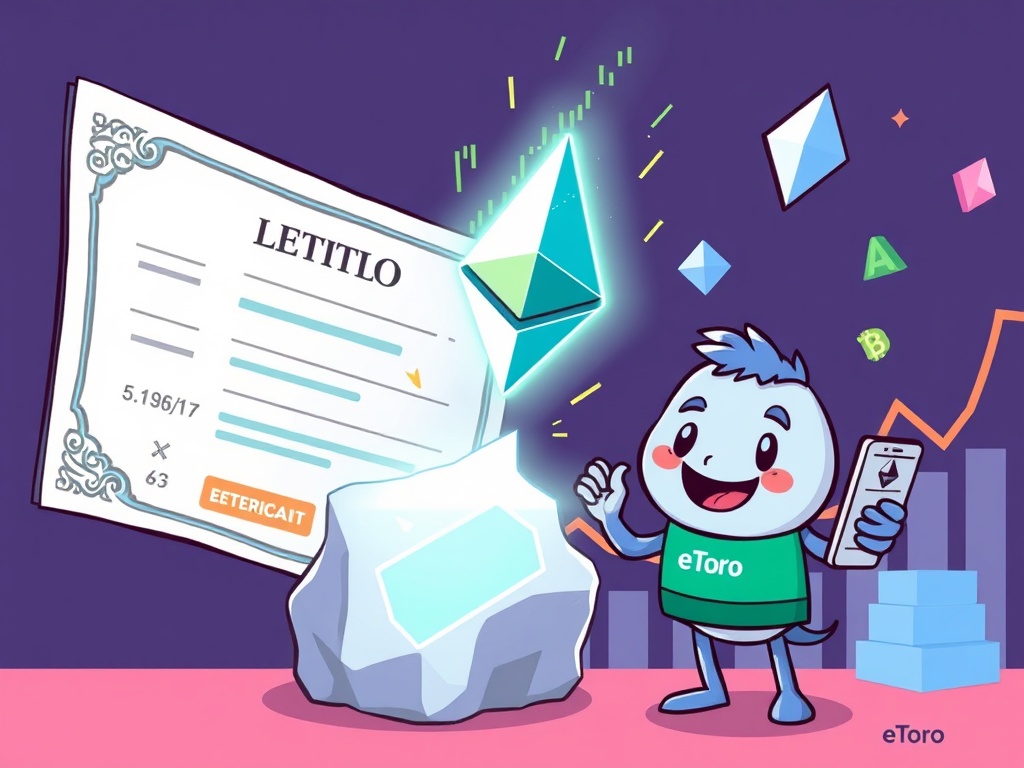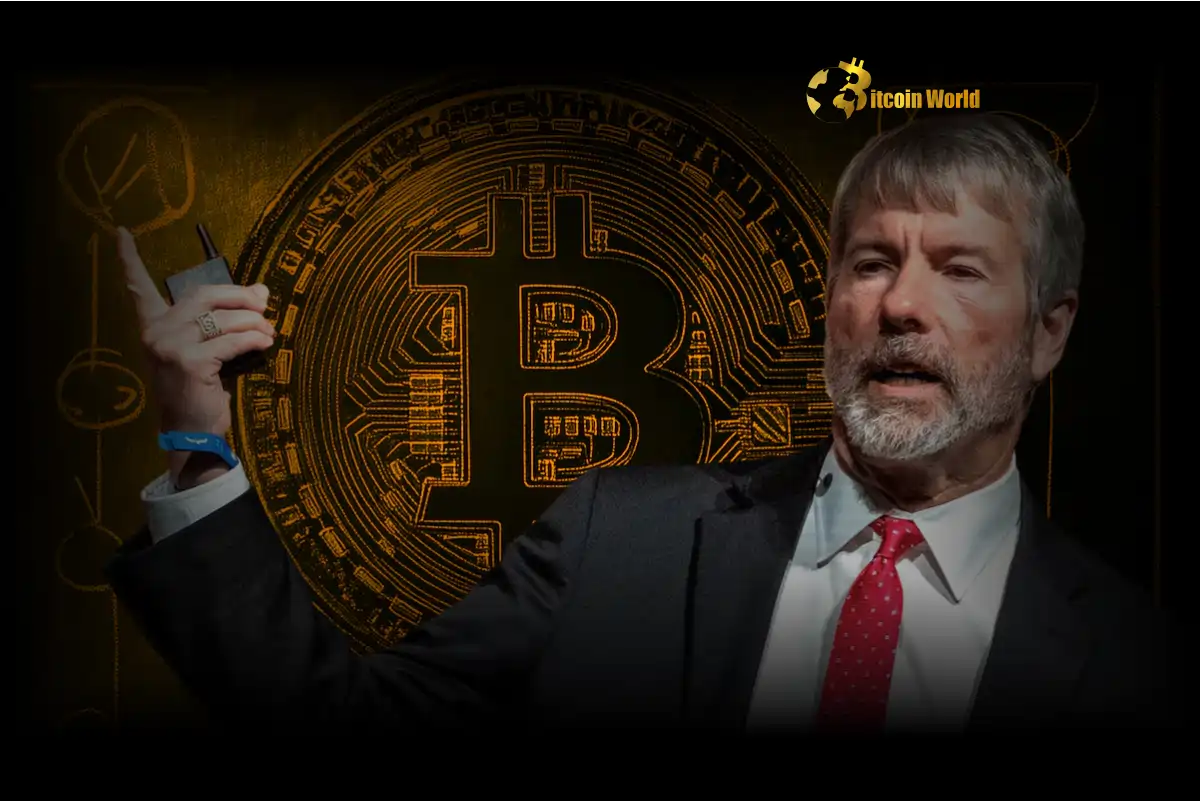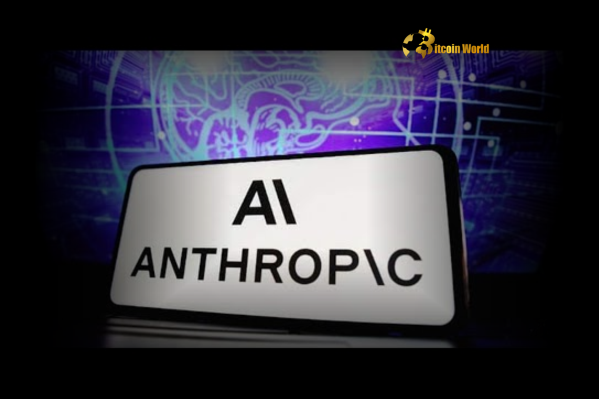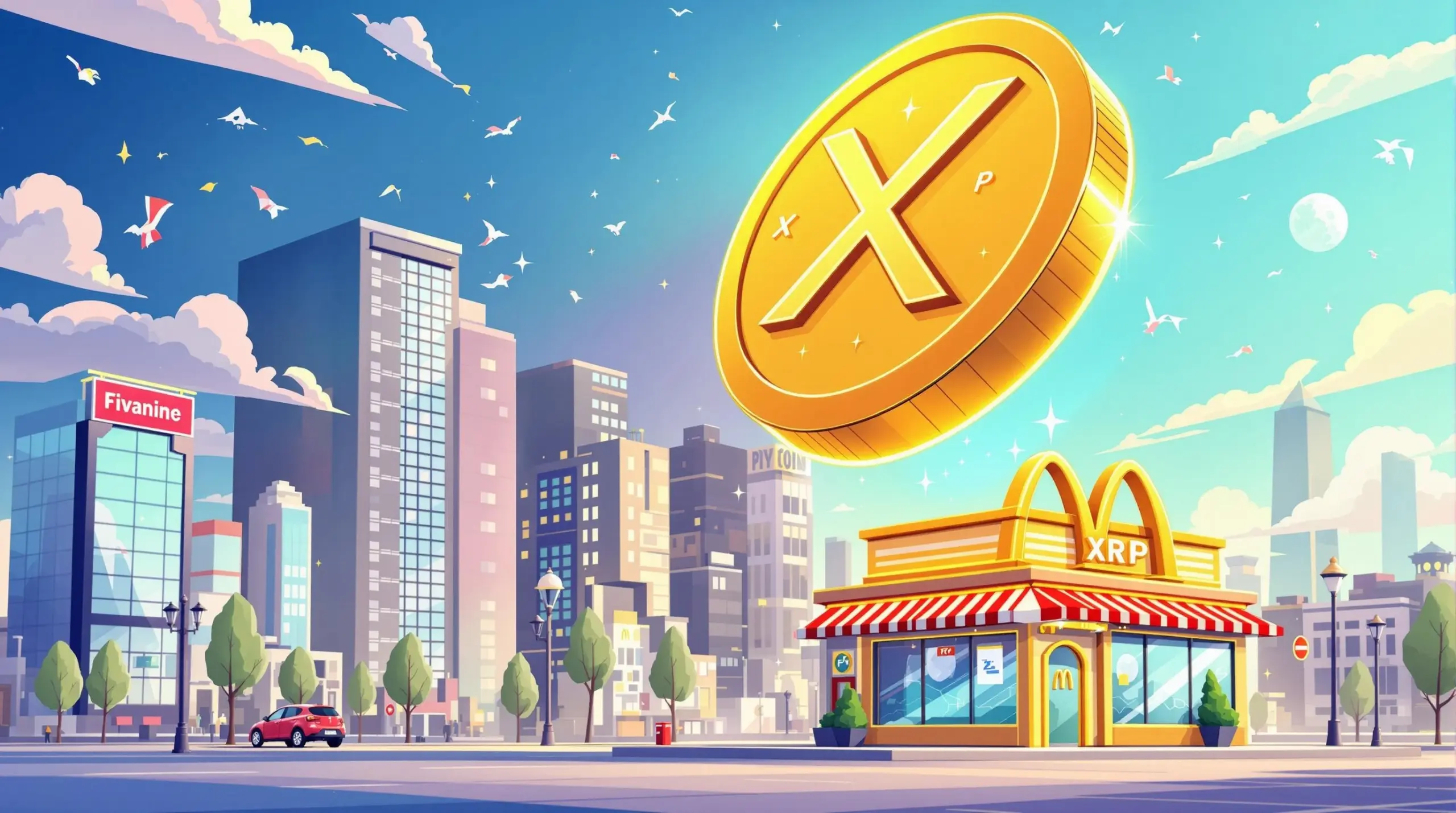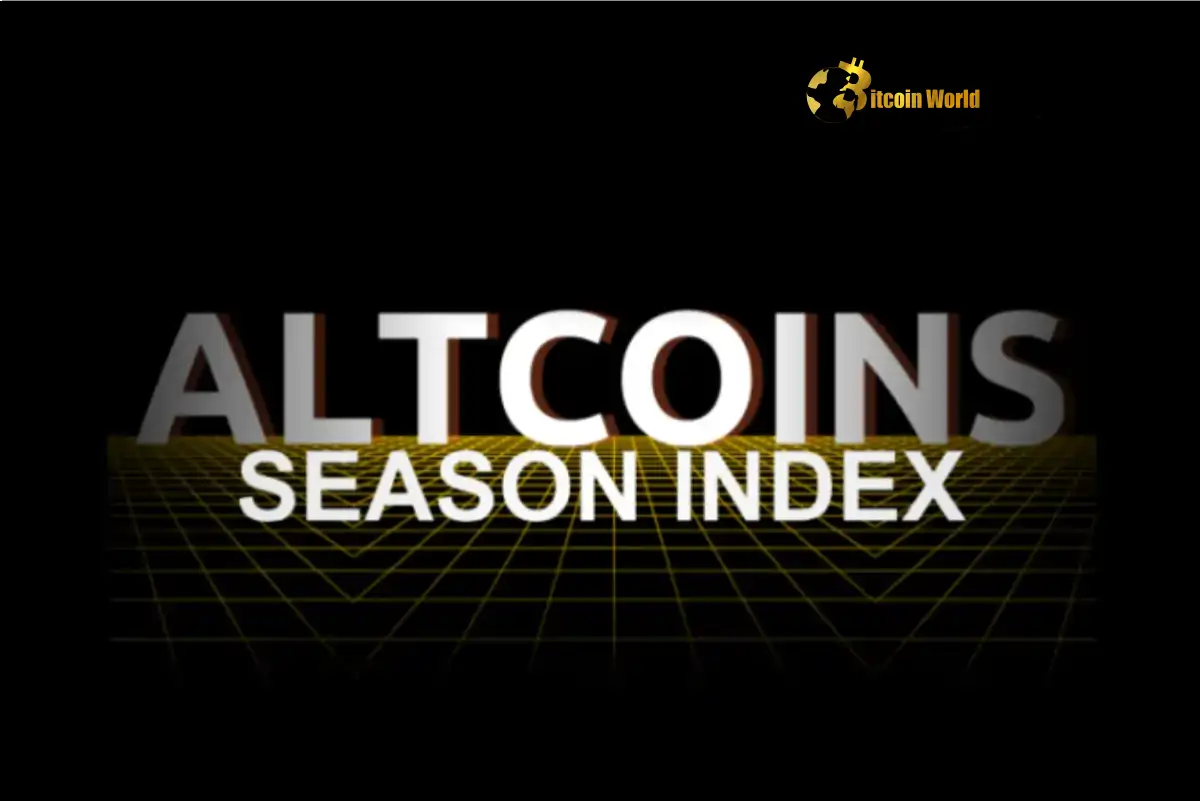BitcoinWorld

Tokenized Stocks: eToro’s Revolutionary Move on Ethereum

The world of finance is constantly evolving, and at the forefront of this exciting transformation is the convergence of traditional investments with cutting-edge blockchain technology. Imagine owning a piece of your favorite company’s stock, not just as a traditional certificate, but as a digital asset that can be traded instantly, 24/7, with enhanced transparency. This is no longer a futuristic dream but a rapidly approaching reality, thanks to pioneering platforms like eToro. A recent buzz, amplified across social media channels, suggests that eToro, a popular mobile investment app known for its cryptocurrency trading features, is poised to take a monumental leap by issuing tokenized U.S. stocks on the Ethereum (ETH) blockchain. This isn’t just news; it’s a potential game-changer for how we perceive and interact with financial markets.
What Are Tokenized Stocks and Why Are They a Game Changer?
Before diving into eToro’s specific plans, let’s demystify the concept of tokenized stocks. Simply put, these are digital representations of traditional shares, issued on a blockchain. Each token represents a real share of a company, with its value mirroring the underlying stock’s price. Think of it as digitizing ownership. But why is this so significant?
- Fractional Ownership: Ever wanted to own a piece of a high-priced stock like Amazon or Tesla but found the entry barrier too high? Tokenization allows you to buy a fraction of a share, making expensive stocks accessible to a wider range of investors.
- 24/7 Trading: Traditional stock markets operate within fixed hours. Blockchain, however, never sleeps. This means you could potentially buy or sell tokenized stocks at any time, day or night, from anywhere in the world.
- Increased Liquidity: With lower entry barriers and continuous trading, tokenized markets could see enhanced liquidity, making it easier for investors to enter and exit positions.
- Transparency and Security: Transactions on a blockchain are immutable and transparent, reducing the risk of fraud and increasing trust. Each transaction is recorded on a public ledger, visible to all.
- Reduced Costs: By eliminating intermediaries and streamlining processes, tokenization can potentially lower transaction fees and other associated costs for investors.
This innovative approach promises to democratize access to financial markets, breaking down geographical and financial barriers that have long existed.
Why Did eToro Choose Ethereum for Tokenized Stocks?
The decision to leverage Ethereum for issuing tokenized stocks is a strategic one, given Ethereum’s prominence and robust infrastructure in the blockchain space. Ethereum is not just a cryptocurrency; it’s a decentralized platform that enables the creation of smart contracts and decentralized applications (dApps).
- Established Ecosystem: Ethereum boasts the largest and most active developer community in the blockchain world, leading to continuous innovation and robust security protocols.
- Smart Contract Functionality: Ethereum’s smart contracts are self-executing agreements with the terms directly written into code. This is crucial for managing the ownership, transfer, and dividend distribution of tokenized stocks automatically and transparently.
- Network Effect: Being the most widely used blockchain for dApps and NFTs, Ethereum benefits from a strong network effect, offering high liquidity and interoperability with other blockchain-based assets.
- Security and Decentralization: While not without its challenges, Ethereum’s decentralized nature and proof-of-stake consensus mechanism (post-Merge) contribute to its security and resilience against censorship and single points of failure.
eToro’s choice underscores Ethereum’s position as a preferred platform for complex financial innovations, despite its historical challenges with high gas fees, which are continually being addressed through scaling solutions.
How Will eToro’s Tokenized Stocks Work?
While the exact operational details are still emerging, the general framework for how eToro plans to issue and manage tokenized stocks on Ethereum would likely involve a few key steps:
- Custody of Underlying Assets: eToro would likely hold the actual U.S. stocks in a regulated brokerage account. These physical stocks act as collateral for the digital tokens issued on Ethereum.
- Token Issuance: For every share held, a corresponding digital token would be minted on the Ethereum blockchain. These tokens would be ERC-20 compatible, making them easily transferable and compatible with the broader Ethereum ecosystem.
- Trading on eToro Platform: Investors would be able to buy and sell these tokens directly through the eToro app, similar to how they trade cryptocurrencies or traditional stocks currently. The app would abstract away the blockchain complexities, providing a seamless user experience.
- Redemption and Dividends: Mechanisms would be in place for token holders to potentially redeem their tokens for the underlying physical shares (though this might be limited to institutional clients or specific conditions) and to receive dividends directly in their eToro accounts or potentially in crypto.
This hybrid model, bridging traditional finance with blockchain, aims to offer the best of both worlds: the security and regulatory compliance of traditional markets with the efficiency and accessibility of decentralized finance.
What Are the Benefits for eToro Users and the Broader Market?
The introduction of tokenized stocks by a mainstream platform like eToro carries significant implications, offering a multitude of benefits:
| Benefit Area | Description |
|---|---|
| Enhanced Accessibility | Lowers barriers for retail investors to access high-value stocks through fractional ownership, potentially opening up markets globally. |
| Global Reach | Allows investors from different jurisdictions to trade U.S. stocks more easily, bypassing some traditional cross-border limitations. |
| Improved Efficiency | Blockchain’s inherent speed and automation can lead to faster settlement times (T+0 instead of T+2), reducing counterparty risk. |
| Diversification Opportunities | Provides new avenues for portfolio diversification by blending traditional assets with digital ones on a single platform. |
| Innovation Catalyst | Pushes the boundaries of financial technology, potentially inspiring other traditional financial institutions to explore blockchain integration. |
For the broader market, eToro’s move could serve as a powerful validation of blockchain’s utility beyond just cryptocurrencies, accelerating the adoption of digital assets in mainstream finance.
Are There Challenges and Considerations for Tokenized Stocks?
While the prospects are exciting, the path to widespread adoption of tokenized stocks is not without its hurdles. Key challenges include:
- Regulatory Clarity: The regulatory landscape for tokenized securities is still evolving globally. Different jurisdictions have varying approaches, which can create complexities for platforms operating internationally. Ensuring compliance with securities laws is paramount.
- Liquidity and Market Depth: Initially, the liquidity for tokenized stocks might be lower compared to traditional markets. Building sufficient market depth will be crucial for efficient trading.
- Technological Scalability: While Ethereum is powerful, its scalability can sometimes be a concern, especially regarding transaction fees (gas) and speed during peak demand. Layer-2 solutions and future Ethereum upgrades aim to address this.
- Security Risks: As with any digital asset, tokenized stocks are susceptible to smart contract vulnerabilities, hacking attempts, or operational errors. Robust security audits and practices are essential.
- Investor Education: Many investors are still unfamiliar with blockchain and tokenization. Educating users about the risks and benefits will be vital for widespread adoption.
eToro, being a regulated entity, will undoubtedly navigate these challenges with due diligence, aiming to provide a secure and compliant environment for its users.
What Does This Mean for the Future of Finance?
eToro’s foray into tokenized stocks on Ethereum is more than just a product launch; it’s a significant indicator of the financial world’s direction. It signals a future where:
- Traditional and Digital Assets Converge: The lines between traditional equities, bonds, and cryptocurrencies will blur, leading to integrated investment platforms.
- Decentralized Finance (DeFi) Expands: The principles of DeFi – transparency, efficiency, and accessibility – will increasingly permeate traditional financial services.
- Global Markets Become More Interconnected: Blockchain’s borderless nature will facilitate easier cross-border investments and capital flows.
- Innovation Accelerates: As more institutions experiment with tokenization, we can expect a wave of new financial products and services.
This move positions eToro as a trailblazer, potentially setting a precedent for how other major investment platforms might integrate blockchain technology to offer novel financial instruments.
Conclusion: A New Era for Investment with Tokenized Stocks
eToro’s reported plan to issue tokenized U.S. stocks on Ethereum represents a monumental step forward in the democratization of finance and the mainstream adoption of blockchain technology. By bridging the gap between traditional equities and the efficiency of decentralized ledgers, eToro is not just offering a new product; it’s helping to redefine the very infrastructure of investment. While challenges remain, the benefits of fractional ownership, 24/7 trading, and enhanced transparency are compelling. This development underscores the growing recognition of blockchain’s potential to create more accessible, efficient, and secure financial markets for everyone. The future of investment is here, and it’s looking increasingly digital.
Frequently Asked Questions (FAQs)
Here are some common questions about tokenized stocks and eToro’s initiative:
-
Q: Are tokenized stocks the same as traditional stocks?
A: No, while they represent ownership in the same underlying company, tokenized stocks are digital representations issued on a blockchain, offering different trading mechanisms and benefits like fractional ownership and 24/7 trading. -
Q: Is eToro regulated for offering tokenized stocks?
A: eToro is a regulated entity in various jurisdictions. When offering tokenized securities, they would operate under existing or new regulatory frameworks specific to digital assets, ensuring compliance with securities laws. -
Q: What are the risks associated with tokenized stocks?
A: Risks include regulatory uncertainty, potential smart contract vulnerabilities, market volatility, and liquidity concerns, especially in nascent markets. Investors should conduct thorough research and understand these risks. -
Q: Can I transfer my tokenized stocks from eToro to another wallet?
A: The ability to transfer tokenized stocks off-platform to personal wallets would depend on eToro’s specific implementation and regulatory requirements. Many platforms that issue tokenized securities keep them within their ecosystem for compliance and ease of management. -
Q: How will dividends be handled for tokenized stocks?
A: Dividends for tokenized stocks would typically be handled by the issuing platform, like eToro. They would likely distribute dividends to token holders in fiat currency or potentially in a stablecoin, mirroring the distribution of traditional stock dividends.
Did you find this article insightful? Share your thoughts on the future of tokenized stocks and eToro’s groundbreaking move! Connect with us and spread the word on your social media channels to keep the conversation going.
To learn more about the latest crypto market trends, explore our article on key developments shaping Ethereum institutional adoption.
This post Tokenized Stocks: eToro’s Revolutionary Move on Ethereum first appeared on BitcoinWorld and is written by Editorial Team

